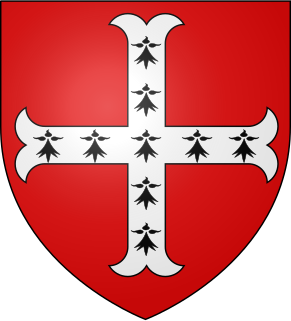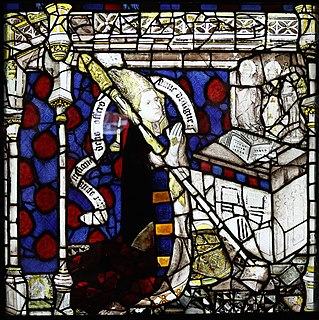Related Research Articles

Richard Poore or Poor was a medieval English bishop best known for his role in the establishment of Salisbury Cathedral and the City of Salisbury, moved from the nearby fortress of Old Sarum. He served as Bishop of Chichester, Bishop of Salisbury and Bishop of Durham.
Geoffrey Rufus, also called Galfrid Rufus was a medieval Bishop of Durham and Lord Chancellor of England.
Silvester de Everdon was a medieval Bishop of Carlisle and Lord Chancellor of England.

William of Kilkenny was a Lord Chancellor of England and Bishop of Ely.

Antony Bek was a bishop of Durham and the Patriarch of Jerusalem.
Hugh de Puiset was a medieval Bishop of Durham and Chief Justiciar of England under King Richard I. He was the nephew of King Stephen of England and Henry of Blois, who both assisted Hugh's ecclesiastical career. He held the office of treasurer of York for a number of years, which led him into conflict with Henry Murdac, Archbishop of York. In 1153, Hugh was elected bishop of Durham despite the opposition of Murdac.
Antony Bek was a medieval Bishop of Norwich.
William Walcher was the bishop of Durham from 1071, a Lotharingian and the first Prince-bishop. He was the first non-Englishman to hold that see and an appointee of William the Conqueror following the Harrying of the North. He was murdered in 1080, which led William to send an army into Northumbria to harry the region again.
William of St. Barbara or William of Ste Barbe was a medieval Bishop of Durham.
Nicholas Farnham was a medieval Bishop of Durham.
Robert of Holy Island was a medieval Bishop of Durham.

Walter Skirlaw was an English bishop and diplomat. He was Bishop of Durham from 1388 to 1406. He was an important adviser to Richard II of England and Henry IV of England.
William Lenn was a medieval bishop of Chichester and bishop of Worcester. The name Lenn was the old name for Lynn in Norfolk.

Hugh of Northwold was a medieval Bishop of Ely.

William of Louth, also known as William de Luda was a medieval Bishop of Ely.

John Hotham was a medieval Chancellor of the Exchequer, Lord High Treasurer, Lord Chancellor and Bishop of Ely. He was also effective Governor of Ireland for a time.

Richard Beauchamp was a medieval Bishop of Hereford and Bishop of Salisbury.
Gilbert Segrave was a medieval Bishop of London. He was the son of Nicholas Segrave, 1st Baron Segrave.

Robert Wyvil was a medieval Bishop of Salisbury.
John Sandale was a Gascon medieval Lord High Treasurer, Lord Chancellor and Bishop of Winchester.
References
- Carver, M. O. H. (1980). "Early Medieval Durham: the Archaeological Evidence". Medieval Art and Architecture at Durham Cathedral. British Archaeological Association Conference Transactions for the year 1977. Leeds, UK: British Archaeological Association. pp. 11–19. OCLC 13464190.
- Fryde, E. B.; Greenway, D. E.; Porter, S.; Roy, I. (1996). Handbook of British Chronology (Third revised ed.). Cambridge: Cambridge University Press. ISBN 0-521-56350-X.